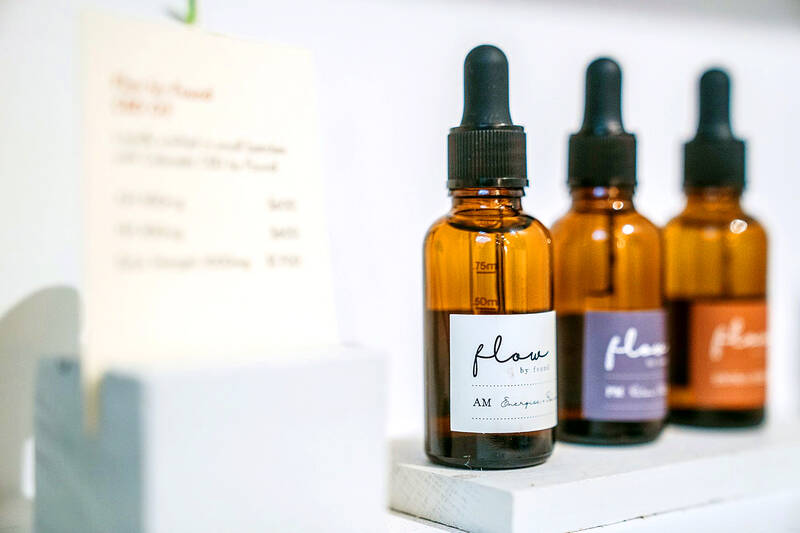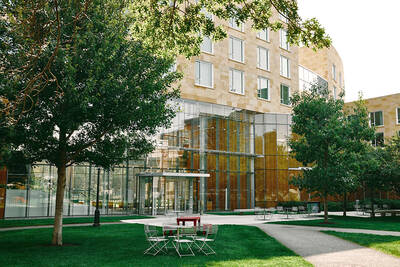Hong Kong will ban cannabidiol (CBD) starting Wednesday, categorizing it a “dangerous drug” and mandating harsh penalties for its importation, production and possession, customs authorities said yesterday.
Supporters have said that CBD treats a range of ailments including anxiety and that, unlike its more famous cousin, THC — which is already illegal in Hong Kong — CBD does not get users high.
Derived from the cannabis plant, CBD was previously legal in Hong Kong, where bars and shops sold products containing it.

Photo: Bloomberg
However, Hong Kong authorities last year prohibited the substance — a change that is to take effect next week.
Residents were given three months from Oct. 27 to dispose of their CBD products in special boxes set up around the territory.
“Starting from February 1, cannabidiol, aka CBD, will be regarded as a dangerous drug and will be supervised and managed by the Dangerous Drugs Ordinance,” Hong Kong senior intelligence analyst Au-Yeung Ka-lun (歐陽嘉倫) said at a news conference.
“As of then, transporting CBD for sale, including import and export, as well as producing, possessing and consuming CBD, will be illegal,” Au-Yeung said.
Penalties include up to life in prison and HK$5 million (US$638,579) in fines for importing, exporting or producing CBD.
Possession of the substance can result in a sentence of up to seven years and HK$1 million in fines.
In announcing the ban last year, the Hong Kong government cited the difficulty of isolating pure CBD from cannabis, the possibility of contamination with THC during the production process and the relative ease by which CBD can be converted to THC.
“We will tackle all kinds of dangerous drugs from all angles and all ends, and the intelligence-led enforcement action is our major goal,” Hong Kong Airport Command divisional commander Chan Kai-ho told reporters yesterday.
Despite the harsh penalties mandated, Chan said authorities would handle enforcement on a case-by-case basis and “seek legal advice from our Department of Justice to determine what the further actions will be.”
Hong Kong maintains several categories of “dangerous drugs,” which include “hard drugs” such as heroin and cocaine, as well as cannabis.
Hong Kong’s first CBD cafe opened in 2020, and the ban would force scores of businesses to remove CBD-infused candies, drinks and other products, or shut down altogether.
The ban is in keeping with a zero tolerance policy toward recreational drugs in Hong Kong and mainland China, where CBD was banned last year.
Chinese authorities have waged battles against heroin and methamphetamines, particularly in southwest areas bordering on the drug-producing Golden Triangle region spanning parts of Laos, Myanmar and Thailand.
Criminal penalties for sale and usage are also enforced for cannabis.
In one of the most high-profile cases, Jaycee Chan (房祖名), the son of Hong Kong action star Jackie Chan (成龍), served a six-month sentence in 2014 and 2015 for allowing people to consume cannabis in his Beijing apartment.
At the same time, China has been a main source of the precursor chemicals used in the manufacture of the dangerous drug fentanyl, a trade often facilitated through social media.
A wealthy Asian financial center with a thriving commercial port and major international airport, Hong Kong is a key point of entry to China as well as a market for some drugs, especially cocaine.
Police recently seized hundreds of kilograms of the drug, some of it hidden in a shipment of chicken feet from Brazil.
Most Asian nations maintain strict drug laws and enforce harsh penalties for violators, including the death penalty, with the exception of Thailand, which made it legal to cultivate and possess cannabis last year.
Debate over CBD policy continues in many countries and regions.
Cannabis-derived products have become increasingly popular in lotions, tinctures and foods.
While their legal status has been murky in the US, several US states and other countries have legalized or decriminalized such substances.

‘THEY KILLED HOPE’: Four presidential candidates were killed in the 1980s and 1990s, and Miguel Uribe’s mother died during a police raid to free her from Pablo Escobar Colombian presidential candidate Miguel Uribe has died two months after being shot at a campaign rally, his family said on Monday, as the attack rekindled fears of a return to the nation’s violent past. The 39-year-old conservative senator, a grandson of former Colombian president Julio Cesar Turbay (1978-1982), was shot in the head and leg on June 7 at a rally in the capital, Bogota, by a suspected 15-year-old hitman. Despite signs of progress in the past few weeks, his doctors on Saturday announced he had a new brain hemorrhage. “To break up a family is the most horrific act of violence that

HISTORIC: After the arrest of Kim Keon-hee on financial and political funding charges, the country has for the first time a former president and former first lady behind bars South Korean prosecutors yesterday raided the headquarters of the former party of jailed former South Korean president Yoon Suk-yeol to gather evidence in an election meddling case against his wife, a day after she was arrested on corruption and other charges. Former first lady Kim Keon-hee was arrested late on Tuesday on a range of charges including stock manipulation and corruption, prosecutors said. Her arrest came hours after the Seoul Central District Court reviewed prosecutors’ request for an arrest warrant against the 52-year-old. The court granted the warrant, citing the risk of tampering with evidence, after prosecutors submitted an 848-page opinion laying out

North Korean troops have started removing propaganda loudspeakers used to blare unsettling noises along the border, South Korea’s military said on Saturday, days after Seoul’s new administration dismantled ones on its side of the frontier. The two countries had already halted propaganda broadcasts along the demilitarized zone, Seoul’s military said in June after the election of South Korean President Lee Jae-myung, who is seeking to ease tensions with Pyongyang. The South Korean Ministry of National Defense on Monday last week said it had begun removing loudspeakers from its side of the border as “a practical measure aimed at helping ease

CONFLICT: The move is the latest escalation of the White House’s pitched battle with Harvard University as more than US$2 billion is suspended US President Donald Trump’s administration threatened to assume ownership of hundreds of millions of dollars worth of patents from Harvard University, accusing the Ivy League college of failing to comply with the law on federal research grants. In a letter to Harvard president Alan Garber on Friday, US Secretary of Commerce Howard Lutnick said the university is failing its obligations to US taxpayers, paving the way for a process that could result in the government seizing its patents under the Bayh-Dole Act. Harvard has until Sept. 5 to prove it is complying with the requirements, including whether it showed a